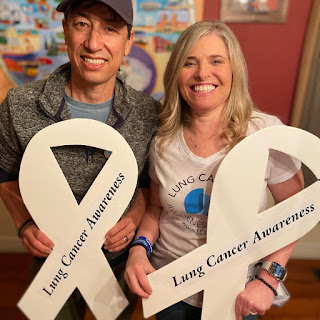Community Building in the Age of Precision Medicine
When I was
diagnosed with lung cancer years ago, my wife (who is a nurse) told me that the
first thing I needed to do was to become my own advocate – to be proactive in
seeking information about my disease and my care strategy. Of course, this was
before the advent of genetic testing and the era of precision medicine. But
even today, too many cancer patients die or suffer through toxic treatments and
expensive hospitalizations when state of the art molecular testing could have
offered better options with either approved treatments or promising clinical
trials. Most patients are not as proactive and self-advocating as they could
be, and there is a need to raise this awareness about just how a newly
diagnosed patient can become his/her own advocate. One way is to connect with
other patients with a similar diagnosis, either online or in person.
More and
more cancer patients are attending medical conferences and connecting with
other patients. In many cases, because of molecular testing that has identified
a specific mutation, patients can meet other patients with the same genetic
mutation. Some end up forming groups (communities) to share their common
journey. One example is a group with the identified non-small cell lung cancer
(NSCLC) mutation called ROS1. Tori
Tomalia, a two-time cancer survivor currently living with stage 4 NSCLC, helped
form the group after attended a conference where she made some connections with
others with the ROS1 mutation. The group ultimately started a private Facebook
page, and began connecting with other patients with the ROS1 mutation. The
group became a place for to share treatment journeys, discuss clinical trials,
exchange advice on symptom management and pool their knowledge. As the group
grew to over 100 people, they realized that they could make an impact and came
up with the idea to approach a foundation about doing a custom research study.
They realized that they could become their own advocates in a very big way by
leveraging their numbers to hopefully move research forward. They contacted The
Bonnie J. Addario Lung Cancer Foundation (ALCF) and they agreed to get behind a
research
initiative.
ROS1 It is a
rare mutation that affects only 1-2% of NSCLC diagnoses, but also one that has
a currently approved treatment that targets this mutation, crizotinib
(Xalkori). Xalkori was initially approved by the U.S. Food and Drug
Administration (FDA) to treat patients whose non-small cell lung cancers
(NSCLCs) harbor an alteration in a gene called ALK, which occurs in up to 8
percent of patients with the disease. In March, 2016 the FDA expanded the use
of Xalkori to include lung cancers with a second abnormality, the ROS-1 gene
alteration. Because ROS1 also occurs in
several cancer types including gastric cancer, ovarian cancer, glioblastoma,
melanoma etc., ALCF wanted to focus on this under-studied rare molecular subset
of cancer and understand what drives oncogenesis and disease progression in
these tumors. So in collaboration with this group of cancer patients whose
tumors have ROS1 fusions (they call them the ROS1ers), they launched a global
effort to study ROS1 fusions across ALL tumor types.
This is a
great example of patient empowerment and advocacy, started because a group of
patients who met at a medical conference realized together they could make a
difference. Using the power of social media, they built a community and took
the initiative to approach a foundation to advance research. We’ve come so far
with molecular testing – lung cancer patients now realize it’s not just one
disease, and there are opportunities to connect with other patients with
similar diagnoses. And also the opportunity to find targeted treatments or
clinical trials for their specific mutation. I continue to advocate for more
research funding because, like with these ROS1ers, we can identify more
mutations, build more communities, and discover more targeted treatments.
#CancerResearchEvangelist
#PrecisionMedicine
